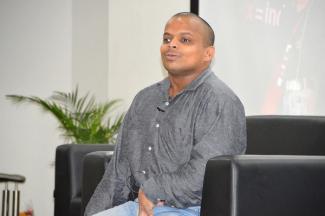
Siddharth Jayakumar has Cerebral Palsy but did not want a data entry job. He loves to work in an office and interact with people. He shares the high points of his career as a senior banker, challenges of his professional life and advise for both people seeking jobs and hiring managers.
How long have you been working Siddharth?
I have been working for close to 12 years now in the banking industry in the area of trade finance. I started my career in 2005 witth ABN Amro/RBS and I’m now with the IndusInd bank.
What is your job like?
At present, I am a trainer in trade finance and risk. I have had a very challenging career, having gone through frequent changes in bosses, work profiles as well as work environments. Prior to being a trainer, my main job was that of a document checker. The work involved knowledge building and sharing and it required diligence.
Describe the process of finding your first job. How did your first interview go?
Getting a job is difficult as it is, And with Cerebral Palsy, its even tougher. People don’t know much about it and have an instant negative reaction to the person without even giving him/her a chance to speak is a common occurrence at interviews. I know it because I have been a victim of this rejection. But I developed patience and after about an eight month wait, I got my first interview call from the ABN Amro HR. It was the first time I got a chance to speak in a place like that and I managed to get a rapt audience. I was very clear that I did not want a data entry job and that I wanted something to test my mind, rather than my body. This clarity helped them understand me better and then they offered me a challenging job in trade finance which involve document checking against letter of credit.
What challenges does CP create for you at your workplace?
CP is tough to deal with. My mind don’t listen to my body and vice versa. One hand-one finger typing, unable to control eye movement and maintain eye contact, and the ever shaking body create various kinds of problems. These issues, in fact, even manage to distract my attention while I am trying to work. So naturally it is tough when you have to talk to your boss with this kind of a disturbing body language!
What accommodations, if any, do your colleagues or organisation have to make for you?
I have never asked for any specific accommodations at my workplace. I have always tried to adjust myself to the environment. Moreover, I am a completely independent person. So I did not really have to ask for any such special concessions. However if I needed something, I have always asked for it.
Given a choice, would you prefer to work from home or in an office?
I never want to work from home. It is very boring. I love to work in an office and interact with people. It helps in mutual learning and building rapport with everyone away from home.
What helps you to succeed at work?
Work is not an independent exercise. When we have so many people around, it is important to recognise the team success first after which comes an individual’s success. With this logic, I am lucky that I had good bosses who made me work hard and great colleagues to support me in the work. I think that is the ideal environment for a professional to flourish.
What is your advice to other people with disabilities?
We need to also deliver what people expect from us rather than always keep asking from others. Focus on building relationships with an open mind by helping other people to understand us and we also need to help each other. It can definitely be frustrating when we do not get what we want/desire. But it is also important to stay mature and patient.
What is your advice to hiring managers?
Look for talent and hire those who are willing to contribute. Don’t judge someone from the way they look. Search for qualities that fit the jobs/roles.






